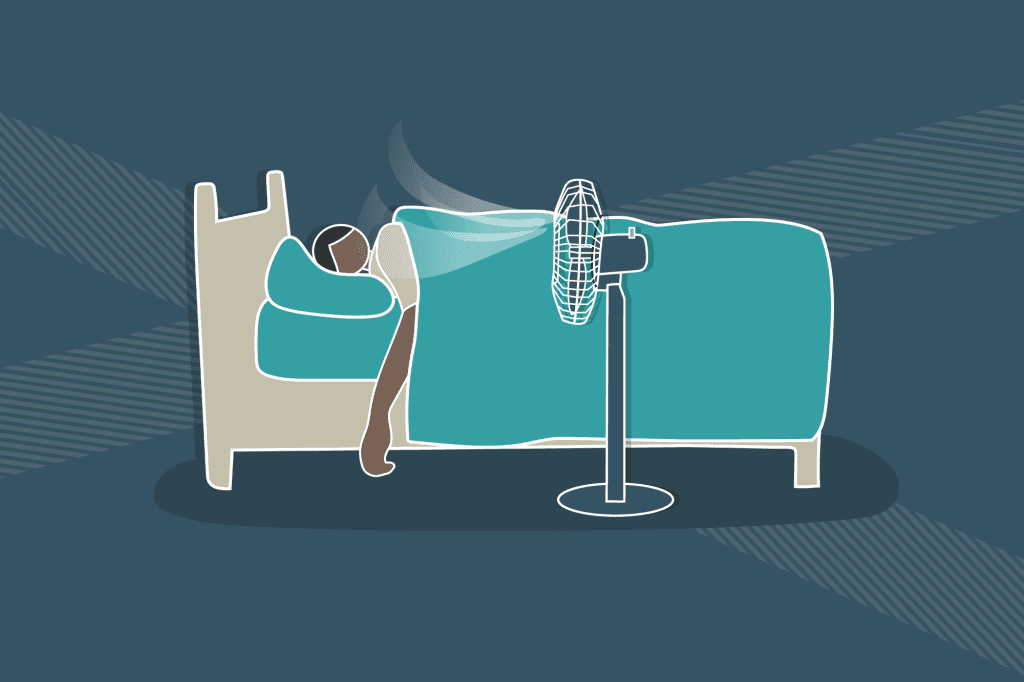For many people, sleeping with a fan on is a nightly ritual. Whether it’s to stay cool on a warm night, enjoy the comforting hum of white noise, or circulate fresh air in a stuffy room, fans have become an essential part of sleep routines.
But could this common habit be doing more harm than good? Recent discussions suggest that keeping a fan on while you sleep might have hidden health effects—both positive and negative. If you’re someone who can’t sleep without a fan, it’s time to take a closer look at how it impacts your health.
Why Do So Many People Sleep With a Fan?

Sleeping with a fan isn’t just about cooling down—it’s about comfort and sleep quality. Here are some of the main reasons why people swear by it:
1. It Keeps You Cool
During hot summer nights, a fan prevents overheating by promoting airflow and evaporating sweat from your skin. Staying cool at night can help you fall asleep faster and stay asleep longer.
2. White Noise Helps Block Out Distractions
A fan creates a steady hum that masks background noises, such as traffic, barking dogs, or a snoring partner. White noise helps your brain tune out disturbances, leading to deeper, uninterrupted sleep.
3. Air Circulation Prevents Stuffy Rooms
If your bedroom feels stuffy or lacks ventilation, a fan can keep the air moving, reducing humidity, odors, and stale air buildup. This can make your sleeping environment feel fresher and more breathable.
But while these benefits sound great, sleeping with a fan on isn’t perfect. There are some health effects you should be aware of.
The Hidden Health Risks of Sleeping With a Fan On
Though many people enjoy the comfort of a fan, it can come with unexpected downsides—especially if you have allergies, asthma, or sensitive skin.
1. It Can Dry Out Your Skin, Eyes, and Throat
The constant airflow from a fan can cause moisture loss, leading to:
- Dry, itchy skin
- Irritated or red eyes
- A dry throat or nasal passages
If you wake up with a scratchy throat or cracked lips, your fan could be the culprit.
2. It Can Worsen Allergies and Respiratory Issues
Fans circulate dust, pollen, pet dander, and mold spores around your room, which can trigger allergies and asthma attacks. If you suffer from:
✅ Sneezing or congestion
✅ Watery, itchy eyes
✅ Wheezing or difficulty breathing
Your fan might be blowing allergens directly into your airways all night long.
3. It Can Lead to Muscle Stiffness and Sinus Congestion
Sleeping with a fan on lowers the room temperature, but this sudden chill can cause muscle cramps or stiffness, especially in the neck and shoulders.
Additionally, cold air can make your sinuses produce excess mucus, leading to:
❌ Morning stuffiness
❌ Headaches
❌ A runny nose
If you wake up congested or with a stiff neck, your fan may be to blame.
Expert Opinions: Is Sleeping With a Fan Actually Bad?

So, what do sleep experts and health professionals say about this? It depends on the individual.
Doctors generally agree that:
- Fans can improve sleep by providing a cool, comfortable environment.
- White noise helps reduce sleep disturbances.
- However, overuse can lead to dryness, allergies, and respiratory discomfort.
If you don’t experience negative side effects, there’s no harm in keeping your fan on. But if you’re waking up with dry skin, congestion, or allergy symptoms, it may be time to reconsider.
How to Minimize the Negative Effects of Sleeping With a Fan
Love sleeping with a fan but want to avoid the downsides? Here’s how you can get the best of both worlds:
1. Use an Air Purifier Alongside Your Fan
Adding an air purifier can help remove dust, pollen, and allergens from your room, so your fan isn’t constantly circulating airborne irritants.
2. Keep Your Fan Clean
Dust accumulates on fan blades, which can worsen allergies. Clean your fan once a week by:
- Wiping blades with a damp cloth
- Vacuuming the fan grill
- Using compressed air to clear dust buildup
3. Adjust Fan Placement
Instead of pointing the fan directly at your face, aim it toward a wall or corner to create indirect airflow. This prevents cold air from hitting your sinuses and muscles.
4. Use a Humidifier to Prevent Dryness
If your fan dries out your throat and skin, a humidifier can help by adding moisture to the air, keeping you hydrated and comfortable.
5. Try Cooling Sheets Instead
Instead of relying solely on a fan, invest in breathable bedding, such as:
- Cotton or bamboo sheets (moisture-wicking)
- Cooling gel pillows
- Light, breathable sleepwear
These can help you stay cool without needing constant air circulation.
Alternatives to Sleeping With a Fan

Not sure if sleeping with a fan is the best option? Here are some other ways to stay cool at night:
✅ Use air conditioning with a temperature control setting
✅ Open windows for natural airflow (if the air quality is good)
✅ Take a cool shower before bed
✅ Use blackout curtains to keep heat out during the day
✅ Drink cold water before bed to regulate body temperature
Final Thoughts – Should You Sleep With a Fan On?
At the end of the day, it comes down to personal preference.
✅ If a fan helps you sleep better, go for it—but take steps to minimize dryness and allergies.
❌ If a fan causes discomfort, congestion, or irritation, consider alternatives like air purifiers, cooling sheets, or better room ventilation.
The key is balance—finding what works best for your health and comfort. Whether you’re a die-hard fan sleeper or considering a change, knowing these hidden effects can help you make a more informed choice for better sleep and overall well-being.


